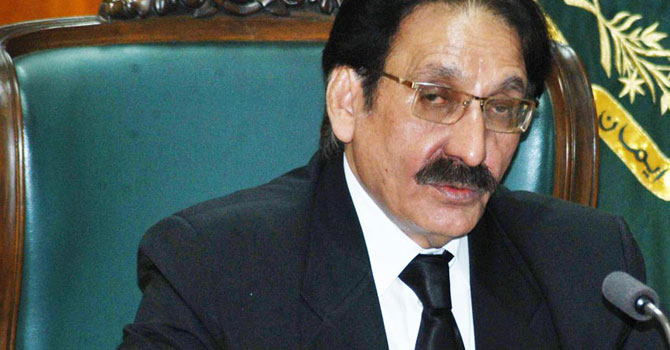
ISLAMABAD, June 15: Chief Justice Iftikhar Muhammad Chaudhry indicated on Friday that he would appear before the National Assembly speaker if and when summoned.
“It’s our parliament,” said the chief justice who was heading a three-judge bench hearing identical petitions challenging National Assembly Speaker Dr Fehmida Mirza’s ruling which saved Prime Minister Yousuf Raza Gilani from being disqualified after his conviction in the contempt case.
The chief justice made the remarks after he asked who was representing the speaker and Attorney General Irfan Qadir replied there was no need for anybody to represent her.
He pointed out that the speaker was a respondent in the petitions. Hypothetically, the attorney general asked, what would happen if the chief justice was summoned by the speaker as a party.
Prime minister’s counsel Barrister Aitzaz Ahsan supported the speaker’s ruling and said that in view of the principle of trichotomy of powers, courts must accord the same respect to other institutions, particularly the sovereign legislature, its speaker and its leader (prime minister), as they expected for themselves.
Alluding to the judgment of Justice Nasirul Mulk, he argued that the concept of ‘subjective satisfaction’ of a court or a judge was alien to the law.
This irked the chief justice who said: “We cannot digest or permit aspersions against judges.” He observed that using the word ‘subjective’ for a judge was not appropriate and said satisfaction of the judges was objective and not subjective.
“It is subjective if it is not shared with the accused,” Mr Ahsan said, adding that none of the words i.e. ‘ridicule, scandalise or defame’ was used in the show-cause notice, charge-sheet, evidence or any of the questions put to the accused.
But the chief justice said these points should have been raised in appeal. “You are taking us to an area which does not fall in our jurisdiction. This is a judgment final and conclusive. We do not want to be irrelevant,” the CJ said and asked Mr Ahsan to avoid coming out with propositions which were not in the domain of the bench.
The counsel insisted that he was before the bench to give arguments against disqualification of the prime minister and not to challenge the conviction. He said he accepted conviction, but argued that every conviction did not necessarily entail disqualification. He said there was no need to challenge the conviction because it had not affected qualification of the prime minister.
The court, however, told him to explain this to his client.
Barrister Ahsan said there was no automatic disqualification without resort to Articles 63 (2) and 63 (3), since there had to be further determination before disqualification was incurred by a member of parliament.
He argued that the conduit and forum for disqualification of a lawmaker had clearly been specified by the Constitution.
“Exercise of power to disqualify, by any other forum, howsoever high, will make the relevant clauses of the Constitution redundant and redundancy cannot be attributed to the Constitution.”
When the chief justice observed that “today, he (the prime minister) has been found guilty of an offence by a court of competent jurisdiction” and the scenario changed when conviction was involved, Mr Ahsan argued that there were specific parameters for disqualification even after conviction.
The counsel said that under Article 63 (1) (h), a person was disqualified from being elected, or being a member of the parliament, if he had been, on conviction of any offence involving moral turpitude, sentenced to imprisonment for a period of not less than two years. “That means even if a person has been convicted of offence involving moral turpitude, he does not stand disqualified from being a member of the parliament.” The court asked how a person convicted of corruption could continue to rule the country. “Will he run the government from jail wearing white clothes?” it asked.
Mr Ahsan said he was not saying it on his own but was reading from the Constitution. He said the speaker was no more a mere post office after a radical change in Article 63 through the 18th Amendment.
Answering a question, the counsel said the speaker exercised quasi-judicial powers under the Constitution. He said the authority of the speaker was sui generis in nature.
The attorney general went one step ahead by saying that the speaker enjoyed supra judicial powers, but was told by the court to wait for his turn. He said she could not abdicate constitutional duty of making decision.
The chief justice said that in other words she had set aside the judgment of the Supreme Court. “Has she got this power?” he asked Barrister Ahsan who replied in the affirmative.
At the outset of the proceedings, Mr Ahsan requested the court to constitute a larger bench to hear the case involving deep and serious consequences.
He will conclude his arguments on June 18.














































Dear visitor, the comments section is undergoing an overhaul and will return soon.